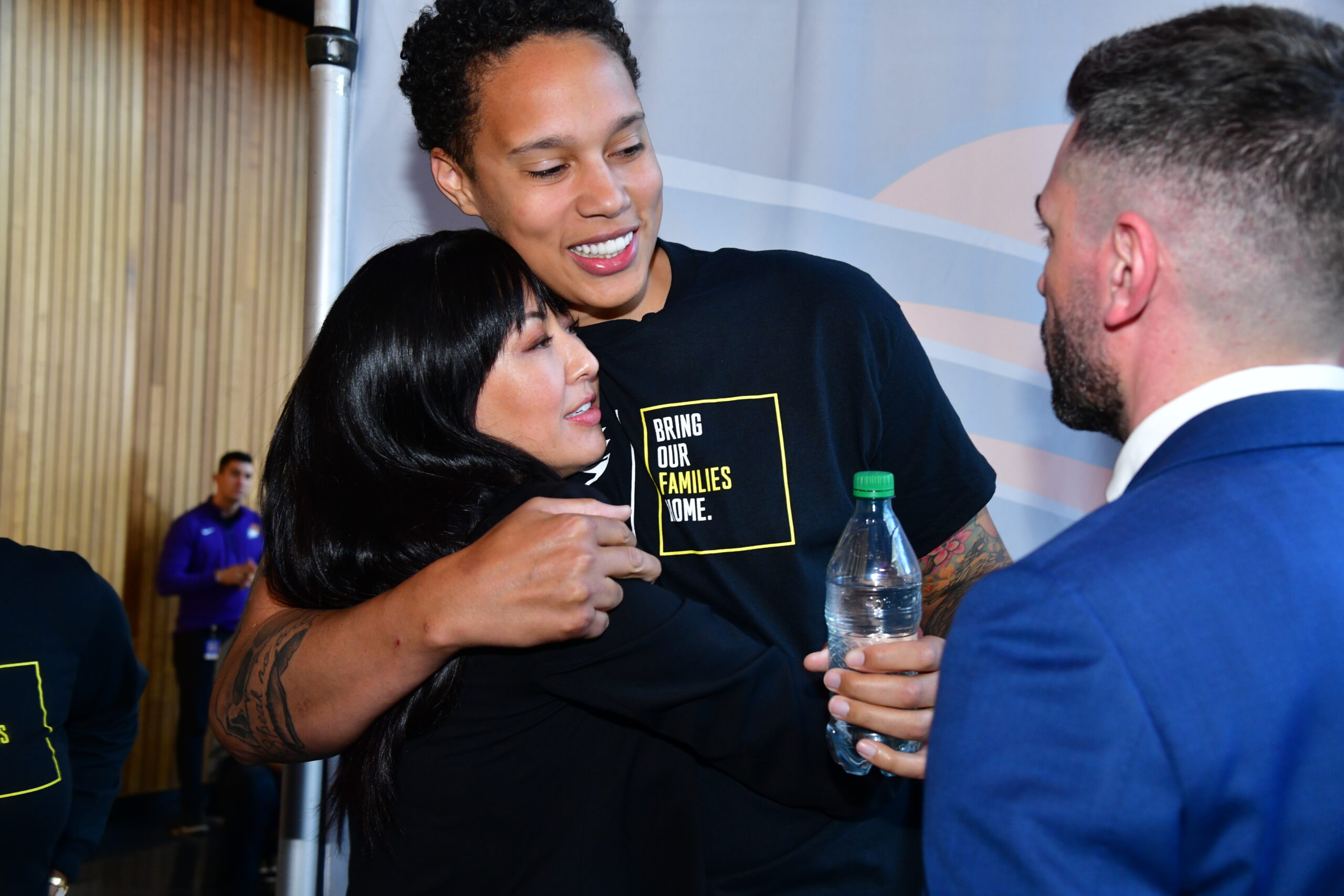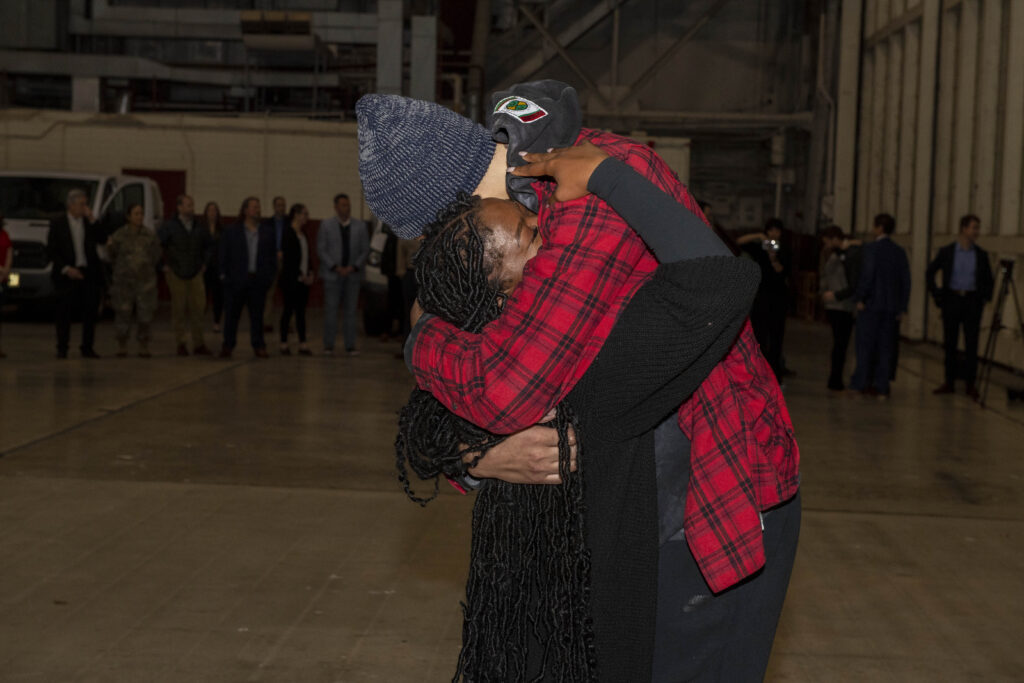The PR team who helped bring Brittney Griner home on how they kept her in the headlines
It was a delicate balance involving great sensitivity and persistence.

This story has been updated to clarify that Griner has not conducted one-on-one interviews since her return.
Securing the release of WNBA star Brittney Griner from wrongful detention in Russia was a monumental feat of politics and negotiations.
But PR also played a critical role.
“It was about screaming from the mountaintop and trying to have the public and ultimately the government and White House pay attention to us, because we knew that without the government support and the support of the White House, she probably wasn’t going to come home,” Calder Hynes told PR Daily. Hynes is senior vice president of global communications at Wasserman, the sports and entertainment talent agency that has represented Griner for years.
Wasserman coordinated efforts to release Griner from her nearly 10-month imprisonment in Russia, a massive undertaking that required working with not only the government, international attorneys and hostage experts, but also the WNBA, USA Basketball and the court of public opinion.
In an interview with PR Daily, Hynes and Griner’s longtime agent Lindsay Kagawa Colas revealed how they worked to first keep the incident quiet – and then how to ensure every American viewed Griner as their sister, daughter or neighbor.
This story was in part developed based on reporting from “Inside Brittney Griner’s Russia arrest, detainment and release,” written by ESPN’s T.J. Quinn, for details around Griner’s arrest and detention. All quotes with Kagawa Colas and Hynes are from interviews with PR Daily.
An early morning call and an international incident
Kagawa Colas was awakened early one morning by a call from a colleague. There was a problem. The information they had was slim, just a text from Griner’s wife, Cherelle, that the basketball star had been arrested as she returned to Russia to kick off her play with UMMC Ekaterinburg due to her possession of two marijuana vape cartridges.

Brittney Griner and Lindsay Kagawa Colas after Griner’s release from Russian detention. Photo provided by Wasserman.
At first, this was just another problem to solve. A day in the life of a sports agent.
“We were still hoping that this was going to be a sports diplomacy issue that could be solved,” Kagawa Colas told PR Daily. “Some misunderstanding. She has a prescription for this medically prescribed cannabis oil. I’m sure we can figure this out.”
“The initial (PR) approach was, let’s try to keep this out of public knowledge. Move past it,” Hynes recalled.
But the timing meant that this would be more than a minor drug bust. Griner was detained on Feb. 17, 2022.
One week later, Russia invaded Ukraine.
From quiet to loud
For more than two weeks, few people outside Griner’s immediate circle knew of her detention. But on March 5, Russia itself broke the news of her detention, forcing her team’s hand.
“That was one of those early signals that she was a political pawn,” Kagawa Colas said. “And they were going to start using this as a negotiation.”
That began a new, cautious phase of efforts. The team wanted to correct misinformation and advocate for Griner, but they didn’t want to exacerbate the situation unnecessarily.
“It was more about being factual, trying to provide the public and the press with what they needed, keep them close, while at the same time not trying to go out there with an agenda or pushback about why she’s there, or why she isn’t, or what the treatment is in regards to her safety,” Hynes said. “We couldn’t really start a back and forth with the Russian government.”
But the months of Griner’s confinement dragged on. By August, she had been sentenced to a staggering nine years’ incarceration. By November, she was transferred to a Russian labor camp, where she was tasked with carrying bolts of cloth — she was too tall to perform the sewing other women did — and breaking ice. The cold weather required her to cut her trademark locs after they kept freezing.
At home, the campaign to bring her home began to ramp up.
“Early, it was ‘be quiet,’” Kagawa Colas remembered. “‘Let’s not raise her value. Let’s see if we can resolve this quietly.’ Then it was, ‘if we want to keep her visible and make sure she’s a priority at the White House, how do we do that without compromising the White House and compromising the negotiation?’”
One issue — and opportunity — was Griner’s identity. She is Black. She is a lesbian. She presents in ways that are gender-nonconforming. That allowed Biden’s political opponents to turn her into a wedge issue to strike at the president, with the fires further stoked by Russian-backed bots on social media. The more controversy around her, the more she could be used as a pawn by Vladimir Putin and his regime. But the team had to speak up. The time for silence had passed.
“How do we simultaneously decrease her value in a trade to make a trade easier, while also ensuring she’s a priority? That is a needle to thread,” Kagawa Colas said.
The answer was a campaign that emphasized unity.
‘BG is for everybody’
The Wasserman team decided that Griner’s multi-layered identity was an asset, not a liability.
“Maybe you can’t see yourself in Brittney Griner, but we’re going to tell you why you actually can,” Kagawa Colas said. In the PR campaign, they emphasized that Griner is the daughter of a veteran and a former law enforcement officer. Her favorite holiday is the Fourth of July. She’s an American hero, having won two Olympic gold medals for her country.
But her Blackness and her sexuality were not avoided either. The Wasserman team said these were obvious reasons that she was detained. As a result, Black women in media became some of the most valuable and powerful voices in the campaign.
“They intimately understood the story,” Hynes said. “And they understood the challenges more easily. They were much more understanding and open to covering the story with a little bit more of a personal connection. But more than anything, we didn’t need to go through all the explanation to them about the lesson. The whys of all this.”
And some did use Griner’s identity to tear her down or even say she should remain in Russia. But the Wasserman team tried to stay above the fray, pointing out that Griner has rights as an American and if you believe in those rights, you should be advocating for her.
The other challenge was that Griner, locked up in Russia, could not speak for herself. She needed advocates. One of those was Kagawa Colas. The other key player was Cherelle Griner, Brittney’s wife.
“Cherelle was just an average American person, had not been a public figure, had not been in the limelight, had not done any media and not really engaged,” Hynes said. “And we were all of a sudden asking her to do an interview on ‘Good Morning America’ with Robin Roberts.”
The Wasserman team helped with media training, giving Cherelle the tools she needed as quickly as possible to succeed in a difficult role. From looking the part to telling her emotional story clearly, she got a crash course — and succeeded.
“Talk about a person who has the utmost strength in all this,” Hynes said. “Cherelle just really delivered.”
Beyond the media relations, there were rallies and events in Arizona, where Griner still plays with the Phoenix Mercury WNBA team, and partnerships with the NBA. Every measure was meant to ensure that attention stayed on Griner and the public remained invested in the effort to bring her home. #WeAreBG was used as a rallying hashtag to encourage others to advocate for and see themselves in Griner, used by both regular people and celebrities like NBA star Carmelo Anthony to keep her name in the news.
View this post on Instagram
And then in December, nearly 10 months after Griner was stopped at customs in Moscow, officials reached a deal. Her freedom was secured in exchange for Viktor Bout, a Russian arms dealer serving a federal prison sentence.
Freedom
When Griner was returned to the United States and reunited with her wife, the team took a moment to celebrate.
“It was overwhelming. It was confusion. It was excitement. It was just pure joy,” Hynes said. “I got very emotional, and I cried because I don’t think I understood how much pent-up emotion I had over this.”
But the moment of celebration was brief. There was still a great deal of work to do.
Even choosing which photo of Brittney and Cherelle reuniting would be released to the media had to be carefully orchestrated.
“We wanted to balance both the historic significance of the moment, the personal, emotional side that grounds the story, and I think they’re the most compelling,” Hynes said.

Brittney Griner reunites with her wife Cherelle after spending nearly 10 months in detention in Russia. Photo provided by Wasserman.
The military and the government were involved, necessitating time and sensitivity as Griner readjusted. But there were also hundreds of interview requests pouring in. So far, Griner has stuck to press conferences and has not yet sat for one-on-one interviews.
“We all realized very quickly that obviously getting her home was the goal, but in her larger story and for our dealing with her, if you want to put it in the context of a PR campaign, it was actually only the first phase. It’s on to this whole next chapter of Brittney’s life,” Hynes told PR Daily.
But overall, Hynes said the campaign reaffirmed his belief in the power of PR to accomplish important things.
“It was gratifying that it seemed like a true-blue PR campaign, even today, can have a really tangible impact on this really positive outcome.”
The return
Griner returned to the court for the 2023 WNBA season, where she shot a career-high 61.8% and was again named an All-Star. Her memoir, “Coming Home,” will be released later this year.
“Coming Home begins in a land where my roots developed and is the diary of my heartaches and regrets,” Griner said in a statement about the book. “But, ultimately, the book is also a story of how my family, my faith, and the support of millions who rallied for my rescue helped me endure a nightmare.”
A documentary with Disney and ESPN on her experiences is also forthcoming. And so, Kagawa Colas says, is a new emphasis on activism and helping other people who are wrongfully detained, including Paul Whelan and Evan Gershkovich.
“We’d like to think that awareness around wrongful detention has been raised,” Kagawa Colas said. “And we helped people gain a better understanding of how important it was to do whatever is necessary to get Americans home. I hope that’ll be a part of her legacy, how many people have come home in the wake of her detention and our campaign bringing her home.”
Because as Hynes pointed out, basketball is only one part of the greater arc of Griner’s life.
“(The detention) is a core part of her identity. Her whole image and persona is just shifted now and long term for her. A lot of this is about setting her up for what she wants to do when she’s ultimately done playing. Who is she gonna be?”
Allison Carter is editor-in-chief of PR Daily. Follow her on Twitter or LinkedIn.








I remember following this from the very beginning and seeing it on social media, but I didn’t know how much was involved in making it all happen. Nice job on explaining the behind-the-scenes activity that was involved in bringing Brittany home.